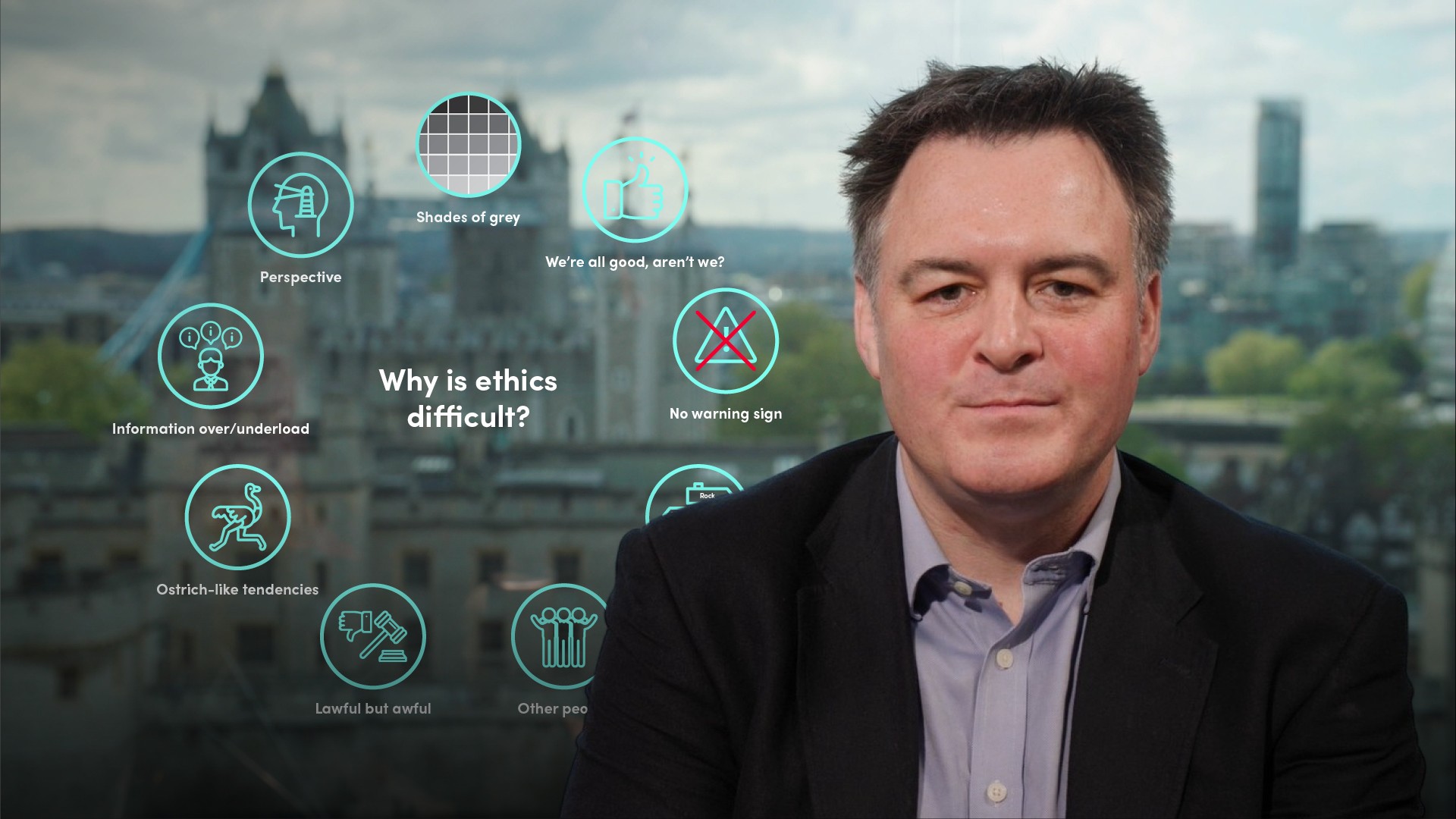
Why Ethics is Difficult II

Christian Hunt
25 years: Behavioural science & compliance
Our ethical principles are more easy to sway than we often like to admit. In this video, Christian explores four reasons why we find it hard to practice ethics and often get things wrong.
Our ethical principles are more easy to sway than we often like to admit. In this video, Christian explores four reasons why we find it hard to practice ethics and often get things wrong.
Subscribe to watch
Access this and all of the content on our platform by signing up for a 7-day free trial.

Why Ethics is Difficult II
12 mins 45 secs
Key learning objectives:
Understand why we get things wrong from an ethical perspective
Identify a further 5 reasons why ethics can be difficult to live by in a complicated world
Overview:
Our ethical principles are more easy to sway than we often like to admit. In this video, Christian explores four reasons why we find it hard to practice ethics and often get things wrong.
Subscribe to watch
Access this and all of the content on our platform by signing up for a 7-day free trial.
Why can real-world ethics be difficult?
5. We’re easily swayed by other people
We like to think that we are autonomous decision-makers, but we’re very easily led by those around us - that might include a boss or a work environment that drives us to think in ways that might not always be ethical. Or, it might simply be a function of being part of a large crowd - for example the biggest single determinant of whether kids will smoke is whether their friends also smoke. The media can also paint a picture that isn’t always representative. If we read reports about a few people not following COVID rules, we can easily be lulled into thinking that no one is complying with them - newspapers and social media tends not to report stories about people who comply with rules. If we’re fed on a media diet of wrongdoing, then we might well draw the wrong conclusion about what others are up to and adjust our own behaviour accordingly.
6. Things can be unethical but legal
One way that we try to navigate ethical situations is to lean on rules or principles, whether a code of conduct, a regulation, a religious book or the law. This is a nice and easy solution - if someone else has decided that we’re allowed to do something or not allowed to do something, then we can use that to justify our decision. This is very often incredibly effective but it can also lead to bad outcomes. It can be very tempting to conclude that something which hasn’t been banned must be acceptable, but if the person writing the rules wasn’t thinking of the particular situation you’re in, then relying on a set of rules might not get the right outcome.
The problem with relying on rules to guide us means that those rules can offer too much latitude. For example, driving licences - a licence permits people to drive vehicles that they have never been in as a passenger, let alone as a driver. If you rely on the law to answer the question as to whether you can drive those vehicles, you can conclude that it’s okay legally. But from a risk management perspective, you shouldn’t.
7. We like to stick our head in the sand
We’re pre-programmed to use our brains as little as possible as the brain is a big user of energy. The more we use it, the more we deplete our resources. In a world where food might be in short supply, it made sense for our ancestors to switch off their brains as much as possible. That can lead us to sticking our heads in the sand - ignoring things and hoping the problem goes away. Often, ignoring problems just makes them worse.
8. We’re over (or under) loaded with information
Sometimes we might find ourselves overloaded with information and we need to filter what we know to come to a conclusion. Likewise, we may find ourselves with very little knowledge and still required to make a decision. When we have too much, we filter out the things that we think aren’t relevant. When we don’t have enough, we plug the gap with presumptions based on things like what we’ve experienced before or what we see others doing. The trouble with that is that what we filter out might be really important when it comes to ethics - if we’re ignoring certain elements, we might miss something critical. Equally, what we fill the gaps with, might be wrong for the particular situation we find ourselves in.
If our brains didn’t work in this way, we wouldn’t be able to navigate the world well. We’d be incapable of making decisions. So it’s very valuable. But it can also lead us to make terrible decisions if the information we’ve ignored or presumptions we’ve added aren’t appropriate from an ethical standpoint. And that’s not uncommon.
9. We’re heavily influenced by our perspectives
When it comes to ethical decision-making, we can be heavily influenced by perspective - we will see things through our own eyes and not through the eyes of other people. Two people can be entirely correct (based on their own perspective) and entirely wrong (based on the other person’s perspective) - for example, the old adage “one mans’ terrorist is another man’s freedom fighter”. Alternatively, think of the difference between The Trolley Problem as seen by the person with the power to pull the lever and as seen by the people on the tracks.
Subscribe to watch
Access this and all of the content on our platform by signing up for a 7-day free trial.

Christian Hunt
There are no available Videos from "Christian Hunt"



























